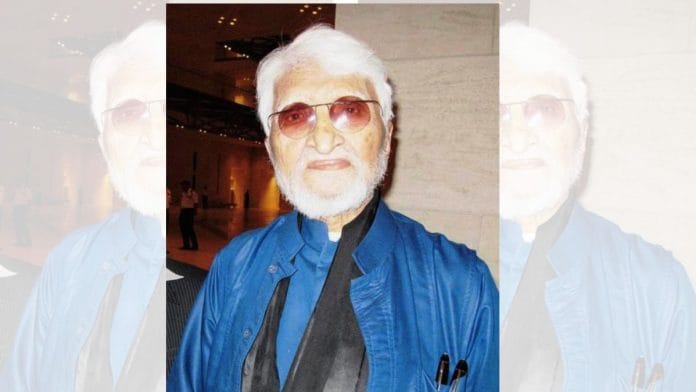New Delhi: In a decision that has sparked widespread debate, a Delhi court Wednesday ordered the seizure of two paintings of Hindu deities by renowned artist M.F. Husain, displayed at the Delhi Art Gallery (DAG). The paintings, which were part of a recent exhibition, were labelled “offensive” by the complainant, advocate Amita Sachdeva, leading to the intervention of the Patiala House Courts.
Judicial Magistrate First Class Sahil Monga passed the order Wednesday, directing the investigating officer (IO) to seize the paintings and file a report the same day. The complaint, filed by Sachdeva after photographing the artworks on 4 December, 2024, alleged that the paintings were offensive in nature and should be removed from display.
The complainant had previously raised concerns based on past FIRs against Husain’s works, which have stirred controversy.
“As per the ATR (Action Taken Report), the Investigating Officer has already seized CCTV footage and the Network Video Recorder (NVR) footage from the gallery to investigate further,” said judge Monga in his order. The paintings were listed as items number six and 10 in the gallery’s inventory of displayed works. The exhibition, held in a private space at the DAG, aimed to present Husain’s original works.
While the court declined to order registration of an FIR against DAG, the paintings continue to be under seizure.
Following the court’s order, DAG issued a statement saying, “It is noteworthy that no other person among about 5,000 visitors at the gallery raised any objection to any of the artworks displayed in this exhibition.”
DAG has denied “any wrongdoing as alleged by the complainant, who has publicly claimed to be principally driven by a religious agenda”.
“In fact, the complainant has herself displayed and publicised the images of the drawings over social media and television news media, deliberately intending them to be viewed by a larger audience, while contending that the same images hurt her personal religious sentiments,” the statement added.
Husain, renowned for his bold and unconventional approach to art, faced significant controversy throughout his career, particularly for his depictions of Hindu deities. His “Bharat Mata” series, featuring a nude representation of India as a woman, sparked outrage in 1996.
Similarly, a 2006 painting by him of the goddess Saraswati provoked public protests, with accusations of offending religious sentiments. Husain’s abstract representations of Hindu gods and goddesses, like Shiva and Durga, in an allegedly controversial manner led to legal actions and threats in the early 2000s.
The intensity of these protests and threats prompted his self-imposed exile in 2010, as his artworks became emblematic of the ongoing conflict between artistic freedom and religious sensitivities. These incidents highlighted the fraught relationship between individual artistic expression and societal norms.
Also Read: MF Husain, the bold & prolific artist who started his journey painting movie billboards
‘Cannot become a nation of hurt sentiments’
The seizure has sparked intense reactions from advocates and defenders of freedom of expression, who have raised alarms about the dangers of restricting artistic freedom over such concerns.
Shabana, a curator at the Delhi-based Tuli Research Centre for India Studies, reflected on the broader issue, saying that this definitely undermines artistic freedom of artists.
Advocate Ayush Samadar further discussed the court’s handling of the case.
“Few things stand out. Firstly, the court’s orders neither display the allegedly objectionable paintings nor provide an explanation for why they are alleged to be offensive by the complainant. Secondly, the court acknowledges that the exhibition took place in a private space, possibly intended for a limited audience,” he said.
“While it is important to acknowledge public sensitivities, it is ultimately the responsibility of the courts to establish clear boundaries on the extent to which individuals can object to or influence an artist’s creative expression. Setting arbitrarily low standards on what is offensive or objectionable can adversely impact the creative freedom exercised by individuals.”
Bharat Chugh, a former judge, highlighted that the judgment underscored the importance of freedom of speech and expression for artists, stressing that creative works should be appreciated in their entirety.
“The law offers, and indeed should offer, significant freedom for artistic and creative expression, provided, of course, there is no incitement to violence or targeting of a community which is criminal,” he said. “In line with this, the court cautioned against hypersensitivity towards art, suggesting that if a person finds art offensive, they should avoid engaging with it rather than seeking to restrict it totally or censor it.”
He added that since art is inherently subjective, what may be seen as cultural and creative expression by one may be viewed as vulgarity by another. “What needs to be kept in mind is the difficulty in drawing a line between creativity, culture, and obscenity, making such judgments a slippery slope.”
Art performs an important public function by reflecting and exploring human experiences, and as such, artists must be afforded the maximum freedom to express these ideas, Chugh further said. “We cannot become a nation of hurt sentiments. We should let a reader or someone who looks at art decide for themselves the merit or the lack of it, and let people think openly for themselves.”
This is an updated version of the report
Lavanya Yadav is an intern with ThePrint
(Edited by Radifah Kabir)
Also Read: Hyderabad’s CCMB was called Sheraton of science labs. MF Husain was its artist-in-residence







So what about NUPUR SHARMA right to free speech ??
Artistic freedom cannot have two different standards – one for Islam and one for all other religions.
If artistic freedom is absolute it must apply equally to all religions.
Time and again, it has been that one set of standards are applied to Hinduism, Sikhism, Christianity and other religions while a totally different aet of standards are applied to Islam.
This is unacceptable in a secular nation.